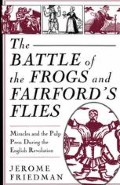Abstract
It is in the nature of counterrevolutions that everything is, once again, turned upside down. That which was once true is so no longer, and that which was formerly sedition is now orthodoxy. Most people found such political acrobatics complex and confusing, especially since they believed that governance reflected God’s will. God, therefore, seemed as confused as an Englishman.
“Tell him of magna carta, he would lay his hand on his sword and cry magna farta.”
The English Devil, or Cromwell (1660)
Access this chapter
Tax calculation will be finalised at checkout
Purchases are for personal use only
Preview
Unable to display preview. Download preview PDF.
Notes
See Geoffrey Cranfield, The Press in Society: From Caxton to Northcliffe (London: Longman, 1978), p. 16, for a complete list of these publications. Unfortunately, no analysis of this undoubtedly very funny literature exists.
Roger Thompson, Unfit for Modest Ears (London: Macmillan, 1979), p. 42. Roger Howell, “The Devil Can Not Match Him’; The Image of Cromwell in Restoration Drama,” Cromwelliana, Cromwell Association, Gloucester, England (1982–3).
G. Kitchin, Sir Roger L’Estrange (London: K. Paul, Trench, Trubner & Co., 1913), p. 267.
Godfrey Davies, The Early Stuarts, 2nd ed. (Oxford: Oxford University Press, 1959), p. 172; Peter Laslett, Family Life and Illicit Love in Earlier Generations (Cambridge: Cambridge University Press, 1977), chapter 3; G. E. Aylmer, The State’s Servants: The Civil Service of the English Republic, 1649–1660 (London: Routledge & Kegan Paul, 1973), p. 307.
Restoration “immorality” is a literary commonplace. See, for instance, Roger Thompson, “Two Early Editions of Restoration Erotica,” The Library, 5th ser., 32 (1977); G. S. Alleman, “Matrimonial Law and the Materials of Restoration Comedy,” Ph.D. diss., University of Pennyslvania, 1942, available on University Microfilms, Ann Arbor, MI; V. de S. Pinto, Sir Charles Sedley (London: Constable, 1927); and the following by J. H. Wilson: A Rake and His Times (London: Muller, 1927); The Court Wits of the Restoration (Princeton: Princeton University Press, 1948); Nell Gwyn (London: Muller, 1952); All the King’s Ladies (Chicago: University of Chicago Press, 1958).
Raymond Crawford, The King’s Evil (Oxford: Oxford University Press, 1911), pp. 105–112.
See D. Underhill, Revel, Riot and Rebellion (Oxford: Clarendon Press, 1985), p. 284. Also, Dudley W. R. Bahlman, The Moral Revolution of 1688 (New Haven: Yale University Press, 1957).
Copyright information
© 1993 Jerome Friedman
About this chapter
Cite this chapter
Friedman, J. (1993). Events in 1660: The Battle of the Frogs and Fairford’s Flies. In: The Battle of the Frog’s and Fairford’s Flies. Palgrave Macmillan, New York. https://doi.org/10.1007/978-1-137-10052-8_12
Download citation
DOI: https://doi.org/10.1007/978-1-137-10052-8_12
Publisher Name: Palgrave Macmillan, New York
Print ISBN: 978-0-312-10170-1
Online ISBN: 978-1-137-10052-8
eBook Packages: Palgrave History CollectionHistory (R0)

